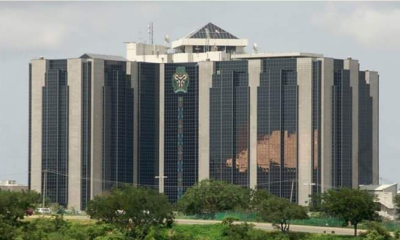TechNews
Deploy robust security technology to fight terrorism – Jonathan


One time Nigerian President, Goodluck Jonathan said the robust deployment of new technology apparatus is needed to confront the insecurity in the country.
He said the establishment of a special unit similar to that of anti-graft agencies – Economic and Financial Crimes Commission (EFCC) and Independent Corrupt Practices and other Related Offences Commission (ICPC) – to manage kidnapping and terrorism-related issues.
Speaking in Akure the Ondo State capital, while condoling with elder statesmen Chief Reuben Fasoranti on the death of his daughter, Mrs. Funke Olakunri, he described Mrs. Olakunri’s death as “painful”.
Jonathan said: “We know we will all die and it does not respect age. But the circumstances of death matters so much. Particularly in this particular case, it is quite a painful incident.
“Every generation of human beings faces problems and that generation must find ways of solving that problem. Every government faces some unique problems.
“Insecurity has been with us immediately after the civil war. That was the first time we experienced armed robbery in Lagos. From armed robbery it graduated to kidnapping.
“The first major kidnapping I describe as commercial kidnapping because some money exchanged hands which happened in 2006 when I was also a governor of Bayelsa State.
“From commercial kidnapping, it moved to terrorism in the North and now, some kind of terrorist attacks all over the country, when people just jump into the road and spray bullets on innocent people; that is terror attack. You have no reason to attack somebody you don’t even know; that is terrorism.
“It is now a major problem to the country and my belief is that the Federal Government working with the state government must design a different approach.
“I was there as a president for some time; security challenges were there with me. I also inherited some. But it is getting worse every day. And we cannot continue to use the same old method.
“As security operatives, the police, the SSS, the armed forces, we must deploy technology and I believe if the Federal Government will need to set up a special unit, just like we set up EFCC and ICPC to handle specific issues of corruption, they will know that their total responsibility is to manage this issue of kidnapping and terrorist attacks on people going on the road or going to the farm.
“We can’t continue that way, it is not just possible, because we can’t talk about managing the economy of this country if people are not safe. Economy is for the people, they must be alive to enjoy infrastructure. Even if you tar all the roads in the country and people cannot move around, then the roads become meaningless.”
Jonathan’s view, security must be approached from a different dimension. “We cannot continue the old way because it is getting out of hand. We hope the federal and state governments will do something about it,” he said.
The former president recalled that a National Conference where some issues were discussed, especially on security, state and regional police was held in 2014 when he was president.
He said: “A lot of things were discussed during the national conference organised during my time as president. The issue of security, state and community policing were discussed. I always believe that government should look at that report, it was not written by me.
“We should not play politics with serious national issues. If we look at that report, there are recommendations that bother on security and if there is an area that needs to be expanded because I believe everyday new idea comes, it should be updated.
“There is nothing wrong holding a specific meeting to look at the issue of security. I believe the federal and state government having a new approach, deploying technology and having more money to protect our people.”


Boxes have a multitude of uses, and the word “box”, lends itself to diverse contexts. For “Ajala Travelers,” the box is a necessity for keeping goods for their endless journeys. In literature, idiomatically, it can be said that “one has been boxed into a corner;” another might say to deal with a conundrum: “think outside the box;” then there is the “Pandora’s box” that no one wants opened.
To “box one’s ear’s” refers to a hit on the head, especially around one’s ears. For those who celebrate Christmas, “Boxing Day,” which is the 26th of December, the second day of Christmastide is not to be joked with: A day to unbox gifts. So much for the box.
Another type of boxes exists in the telecommunications world: The SIM Box. Have you ever received an international call but saw a local phone number ring in? That is SIM Boxing in action. Let me explain.
SIM boxing happens when a person uses a special equipment, what is called a SIM Box containing tens to hundreds of SIM Cards—from 32, to 96, to 512 and more SIMs —to terminate international calls by bringing in the international call into the SIM Box using internet connections and regenerating the calls to the called party from one of the hundred SIMs in the box.
This way, the called party will see the local number of the SIM from the SIM Box, and not the original international number calling.
With SIM Boxes, the syndicate charges international call carriers lower rates than what regular Nigerian telecommunications operators would charge, as they do not have to pay the full cost of maintaining and operating a phone network.
Basically, they are bypassing the normal route for international phone call termination to terminate international calls cheaply and making windfall profits off it.
Take for instance, a telecommunications operator in Nigeria would ordinarily charge international carriers 10cents per minute for terminating an international call in Nigeria. However, by routing the call through a SIM Boxing syndicate, the international telecommunications carrier only pays a fraction of the charge to the syndicate, say 5cents per minute and does not have to pay the full 10cents per minute charge.
The SIM Boxer will terminate this call to the called subscriber at a rate of, say N15 per minute using one of the SIM cards in their SIM Box. The SIM Boxer thus makes a killing from the differential between the rate charged to the international carrier and the rate paid to telecommunications operators whose SIM they utilise in their SIM Boxes, at the expense of our national security and income of mobile network operators and quality of our service to consumers.
Asides the revenue loss that local mobile network operators suffer courtesy the activities of these syndicates, networks face congestion around areas where the illegal call routings via SIM Boxing occurs. With the huge traffic from the boxes, callers around the area see more dropped calls, poor call quality, and slower data speeds.
The introduction of the linking of National Identity Numbers (NIN) to SIMs is one way the Federal Government has worked to tackle this criminal enterprise. With every SIM in the country being linked to an NIN, an identity is tied to the owner of each line, and regulators now have visibility of ownership. That is not all. There is also the “Max-4 Rule” where a subscriber is not allowed to have more than four lines per network operator linked to his NIN. With this rule in place, coupled with the NIN-SIM Linkage, every telephone subscriber in Nigeria would not just be accurately identifiable but limited to having only four telephone lines per subscriber.
To enforce this rule, the Nigerian Communications Commission (NCC) on the 29th of March 2024 announced the deadline for Mobile Network Operators to bar all subscribers who had five lines and above, and whose NIN failed the verification test of biometrics matching.
Over the last few weeks, sources within the NCC have confirmed cases where a single NIN was linked to over 100,000 lines.
Some NINs had well over 10,000 SIMS linked to them, others over a thousand, others had hundreds. Many have questioned the reports and asked, what would any single reasonable person be doing with these number of lines? Justifiable questions, because no sane person—who is not running a business—should own more than five SIM cards.
Given the ‘Max 4 Rule’ in place and the NIN-SIM Linkage Policy, SIM Boxers have been boxed into a corner.
The applications they use require tens to thousands of SIM Cards, and the imperative to stay anonymous. If these policies are well and fully implemented, this is the death knell for SIM Boxing merchants.
But the regulator, NCC needs to be fast and ready for the battle ahead. SIM Boxing is a billion-dollar criminal enterprise. They are not going to go down without a fight. It is like taking a bone being chewed from the mouth of a bulldog.
Already, the battle seems to have kicked off. A lawyer, Barrister Olukoya Ogunbeje has recently taken the Federal Government, NCC and Mobile Network Operators to court, claiming that the barring of SIMs not linked to NINs goes against his fundamental human rights, and has cost him the loss of business opportunities.
Anyone who has Nigeria’s interest at heart ordinarily supports this policy. It then does not add up seeing a so-called activist lawyer take up such a matter that is clearly against the public interest—unless this is the Haka cry of SIM Boxers.
A most interesting observation with his case is that it is not even a class action, but individually driven. It begs the question then, who is funding Barr. Olukoya Ogungbeje? What is his interest in fighting this policy that puts paid to the business of a criminal enterprise? Is he funded by interests in the SIM Boxing world? Time would tell. But in the meantime, NCC must go head on without fear or intimation and clean the Augean stable of SIM ownership in Nigeria.
Suleiman Bala Bakori is a researcher, and writes from the FCT.
TechNews
inq.Digital Supports Payments Forum Nigeria [PAFON 1.0]


Inq. Digital Nigeria Limited has been announced as a sponsor of Payments Forum Nigeria [PAFON 1.0] maiden edition holding this Thursday in Lagos.
inq. Digital Nigeria Limited, a subsidiary of inq. Group is an emerging leading digital and cloud solutions provider that delivers simpler seamless solutions to complex business challenges.
With offices in Lagos, Abuja, Port Harcourt and Kano, inq. provides reliable and affordable Intelligent Connectivity, SDN/NFV, Cloud and Digital services (including Edge –AI) for Nigerian businesses including those in the payment space.
Participation is FREE, however, pre-registration is required: https://bit.ly/4c4N19H.
Speaking ahead of Payments Forum Nigeria [PAFON 1,0] scheduled to take place at Oriental Hotel, Lekki Road, Lagos on Thursday, March 21, 2024 by 9am under the theme: “Payments: Trust, Security and Privacy in AI Era”, Mr. Chike Onwuegbuchi, the co-founder of TechCastle Foundation, the organisers, said the goal is to enable information exchange and knowledge sharing on key industry insights issues amongst key stakeholders, with the objective of ensuring a collaborative and proactive approach to push for policies that enable growth, tackling/mitigating fraud and limiting occurrences and losses.
Speakers
The following speakers are lined up for the Forum: Chibuzo Efobi, Director, Payments System Management, Central Bank of Nigeria (CBN); Festus Amede, Chairman, Committee of Chief Information Security Officers of Nigerian Financial institutions (CCISONFI; Dr. Adewale Peter Obadare, Chief Visionary Officer (CVO), Digital Encode Limited; Adetokunbo Omotosho, Chief Executive Officer, Cybervergent; Roosevelt Elias, Founder, Payble; Ikenna Ndugbu, chief compliance officer, Moniepoint MFB, and Peter Evbota, Sales Director at inq. Digital Nigeria Limited.
Payments Forum Nigeria is organised by TechCastle Foundation and sponsored by: inq. Digital Nigeria Limited, Cybervergent, Moniepoint, Digital Encode Limited, Payble with support from the Central Bank of Nigeria (CBN).
Business
Meet Kingsley Adonu


In the dynamic world of entrepreneurship, there are visionaries who not only navigate the business landscape but redefine it. Meet Kingsley Adonu, the Founder and Chief Executive Officer of the SMobile Group, a conglomerate that stands as a beacon of excellence and diversity in the global business arena.
Kingsley Adonu is a visionary entrepreneur and the Founder of the SMobile Group, a conglomerate synonymous with excellence and diversity. As the Chief Executive Officer, he has steered the group to remarkable heights, overseeing a spectrum of businesses that span across Telecommunications, Oil and Gas, Real Estate, Hospitality, Water Production, Agriculture, Technology, E-commerce, Energy, Sports, Entertainment, Education, Health, Logistics and Financial Services, with branches extending globally to UK, USA, China, South Africa, and Canada.
Under Kingsley’s astute leadership, SMobile Group has emerged as a major partner for MTN, evident in the impactful presence of the SMobile brand in the telecommunications landscape. His strategic insights and forward-thinking approach have positioned the group as a dynamic player in multiple industries.
Beyond the boardroom, Kingsley Adonu is a dedicated philanthropist, committed to making a positive impact in communities. His philanthropic efforts extend beyond business, reflecting a deep-seated belief in the responsibility of successful individuals to contribute meaningfully to society.
Kingsley’s influence is not confined to national borders; he has actively participated in numerous international telecom conferences, further enriching his understanding of global industry trends and fostering valuable connections with industry leaders worldwide.
With an unwavering commitment to excellence, Kingsley Adonu continues to inspire and lead the SMobile Group towards new horizons, blending business acumen with a passion for positive societal change.
-



 News2 days ago
News2 days ago“80% Of Buildings In Lekki Have No Approval” – Lagos State Commissioner For Physical Planning & Urban Development Reveals
-



 Education5 days ago
Education5 days agoFederal Government Sets To Commence School-To-Work Scheme
-



 News4 days ago
News4 days agoLady Dies After Friends Pushed Her Into Boiling Pot Of Fresh Pepper In Delta State
-



 Finance4 days ago
Finance4 days agoEFCC Chairman Tasks Nigerian Youths Against Crimes And Fraudulent Acts
-



 Entertainment2 days ago
Entertainment2 days agoCelebrities Turn Up For The Dedication Of Ali Baba’s Triplets In Lagos
-



 Finance23 hours ago
Finance23 hours agoBanks To Now Charge 0.5% Cybersecurity Levy As Directed By CBN; Netizens React
-



 TechNews2 days ago
TechNews2 days agoSIM Boxing, And The Unboxing of a Crime Syndicate
-



 GRTech24 hours ago
GRTech24 hours agoSHELT SI Achieves Cisco Select Partner Certification







